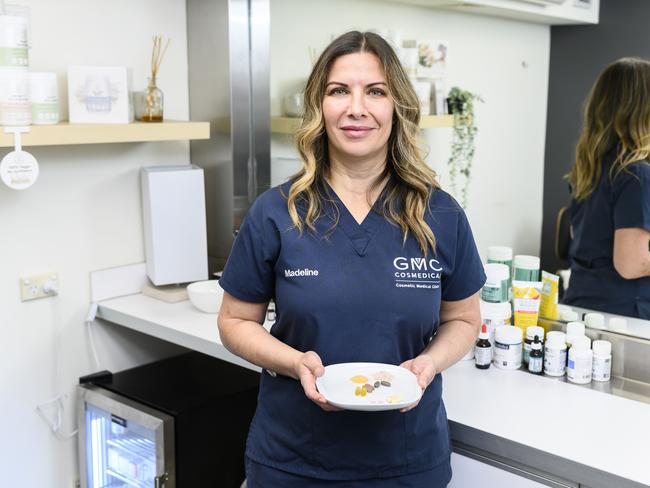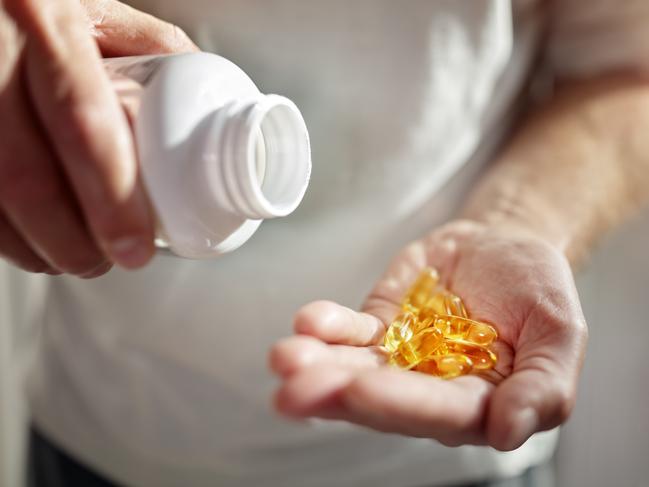Best and worst vitamins for your body
Australians are spending billions of dollars on dietary supplements as the deal with the stresses of modern life. Here’s what to watch out for.
SmartDaily
Don't miss out on the headlines from SmartDaily. Followed categories will be added to My News.
Walking through a chemist’s shop or even scrolling through your social media feed, you could be forgiven for thinking your diet is distinctly lacking. There are a staggering amount of supplements and vitamins aimed at us — from generic brands to the oh-so-expensive variety spruiked online by celebs.
And we’re taking them all.
Australians are some of the world’s largest consumers of dietary supplements, with vitamin and mineral sales totalling more than $2bn every year. And according to 2019 data from Roy Morgan, the number of Australians who purchase vitamins, minerals and/or supplements in an average six-month period is now more than 8.3 million.

While some studies show that most of us are actually getting enough nutrients from our diet already (and many people who take supplements don’t need them at all), nutritionist, naturopath, herbalist and founder of The Wellness Group Madeline Calfas suggests that modern life means supplements can be of real value.
“While we should be aiming for a diet high in fresh quality foods, and supplementing any extras that we may be needing either due to dietary shortfalls or increased requirements from the body (such as athletes and pregnancy), it is important to note that things have changed over the years from the way it once was,” she says.

“Once upon a time we used to eat seasonally. We used to rotate our crops, rest the fields, and soil was rich in nutrients, which was then infused into the foods that were grown in it. Life was generally less stressful, and we had the ability to switch off and rest.
“Fast forward to today and the crops that we are growing are being grown on a mass scale, with very little nutrient content in the soil. Combine that with the influx of processed foods and 24/7 stress, and our bodies are just not able to do what they used to. The nutrients are not as abundant in our foods, and our bodies are less able to absorb and utilise whatever nutrients are there. As a result, supplementing has become more of a necessity.”
When it comes to knowing which supplements to take, however, she advises speaking to an expert.
“Speaking with a health practitioner can help you ensure that you are spending money on those supplements that are actually needed and not wasting money on those that you saw a blogger posting about,” she says.
Once we know which supplements we do need, does the cost and where we buy them matter?
“A supplement should never be purchased purely based on price point,” says Madeline. “Just because it costs more doesn’t always mean that it is better, and just because it’s cheap doesn’t mean it’s no good. It really will depend on what it is that you are buying.
“What matters more than the price is the manufacturer. Generally speaking, practitioner-only brands are going to be more effective, and more reliable, as there is much greater regulation when it comes to their manufacturing processes, quality control etc.”

Oils like omega 3, evening primrose oil and fish oils need to be manufactured using cold-pressing techniques.
“This helps to stop the oils from turning rancid, which can actually end up causing more harm than good,” she says. “The cheaper, bulk buy brands are usually not cold-pressed, which is when it is wiser to buy a more expensive practitioner-only brand.”
“It also means that you have a health professional monitoring what you are taking, and it greatly reduces the possibility of things like drug/nutrient interactions.”
“Just because you are taking a supplement now doesn’t necessarily mean you will need to be on it for the rest of your life,” Madeline adds.
“Your nutritional requirements change as you age, and as your lifestyle and diet changes, so supplements are never a ‘set and forget’ approach.”
WHAT TO SPEND ON
SAVE: On general vitamin and mineral supplements such as Vitamin C, Vitamin D or zinc supplements.
SPEND: Stock up on the pricier practitioner-only brands when it comes to Omega 3, Evening Primrose Oil and Fish Oils.
NB: Madeline says whenever you’re buying supplements, the first thing you should be aware of is what it is you need, and then buy accordingly.
“For example,” she says, “magnesium comes in several different forms, each of which is generally indicated for a different condition. There is not much point in trying to save money and buying the cheaper form if it’s not the form that your body needs.”
MORE NEWS
$13 Apple iPhone: More Click Frenzy deals and how to make cash
Bananarama’s close encounters of the star kind
Shark Quiz: Test your general knowledge
Originally published as Best and worst vitamins for your body
